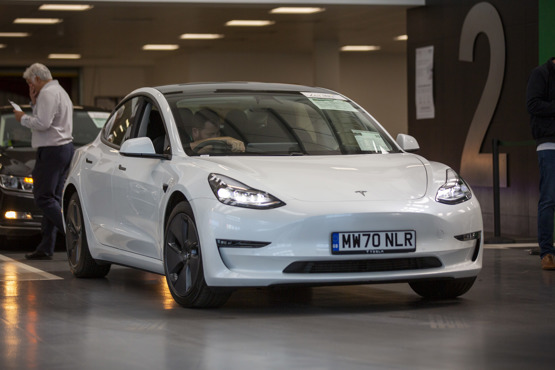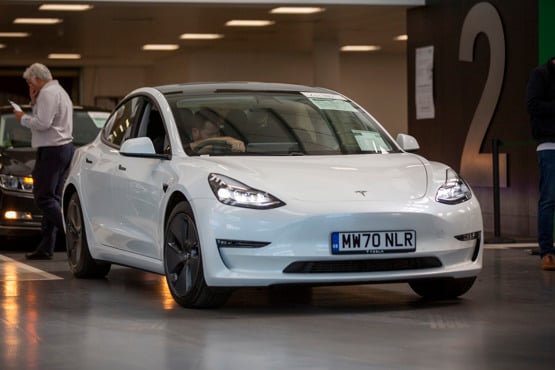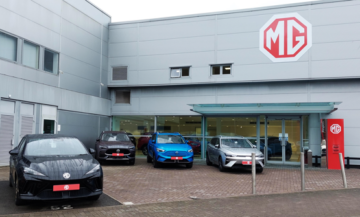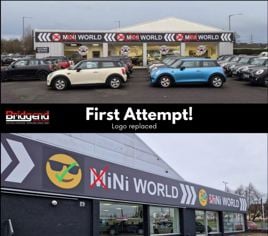Used electric vehicle (EV) values have continued to decline as falling values dent dealer confidence but boost affordability for car buyers looking to make the zero emissions transition, Cap HPI has said.
The valuations specialist’s director of valuations, Derren Martin, had suggested that car retailers who suffered “significant pain” as a result of a recent slump in used EV values could soon be seeking out zero emission forecourt stock once again as declines started to ease.
But a mid-month catch-up with AM this week detailed that used EV values continued to decline at a rate of 3.2% at three years and 30,000 miles, as their petrol and diesel-powered counterparts were up around 0.5%. Overall, the market was up 0.4% month-to-date, he said.
“It is hard to generalise the EV segment, though,” Martin told AM. “Some are performing better than others and have stabilised.”
He added: “We have also seen the EV fire sale of some EV product at the auctions, but we have kept those out of our numbers as they aren’t reflective of the overall market.”
The impact of Tesla’s most recent round of targeted new car price cuts – its second this year – has had a mixed impact on its used car values.
 Martin said that the Model 3 and Model Y values were down 1% month-to-date, with the Model S declining by 5%.
Martin said that the Model 3 and Model Y values were down 1% month-to-date, with the Model S declining by 5%.
While retailers have suffered pain as a result of falling EV values in recent months, Martin said that consumer demand was still there for zero emissions vehicles and suggested that the improved affordability that declines would bring would serve to drive the market.
Consumer demand
“There is always a lag between wholesale and retail pricing. Retailers are hesitant about reducing their forecourt prices for obvious reasons, but that will funnel down to consumers and I think the EV market will stabilise quite quickly at that point,” Martin said.
“We’ve spoken to Government about the affordability of EVs in recent months and I think that the recent declines make it unlikely there will be any support in the way of incentives for used EV purchases in future. The outlook is that they are naturally becoming more affordable.”
Auto Trader data published today showed that used cars took an average of just 23 days to sell in February for franchise retailers – the joint fastest month on record – in a show of the used car sector’s continued strength.
Cars aged five to 10-years-old, and 10 to 15 were the fastest to sell, with both age cohorts taking an average of just 22 days to sell, Auto Trader said.
By fuel type, diesel was the fastest seller at 24 days, followed by petrol (25 days), plug-in hybrids (34 days), full hybrids (31 days), and EVs at an average of 45 days.
Residual value declines
Martin told AM that Cap HPI had been forced to alter the scale of its data charts to accommodate the recent slump in used EV values.
In the past 12 months EV values have declined by 18% at three years and 60,000 miles, with the bulk of that drop coming after September last year.
 In the same period hybrid values have risen 2.1%, petrol 1.6%, plug-in hybrid (PHEV) 0.5% and diesel 0.1%.
In the same period hybrid values have risen 2.1%, petrol 1.6%, plug-in hybrid (PHEV) 0.5% and diesel 0.1%.
The Mercedes A-Class hybrid was the only none-EV model to feature in Cap HPI’s worst 25 performers from a residual value perspective over the past six months, at three years and 30,000 miles. It finished with the second-lowest decline in that ranking, with a decline of 16.1% (£4,438).
Tesla’s Model 3 (down 31.7%, £13,125) and Model X (down 31.1%, £22,994) topped the ranking with the biggest declines, followed by the Mini Cooper Electric (down 30.8%, £7,333).
- SEO Powered Content & PR Distribution. Get Amplified Today.
- Platoblockchain. Web3 Metaverse Intelligence. Knowledge Amplified. Access Here.
- Source: https://www.am-online.com/news/used-cars/2023/03/15/auctions-hold-used-ev-fire-sales-as-values-continue-decline
- :is
- $UP
- 000
- 1
- 10
- 12 months
- 2%
- 2020
- a
- About
- accommodate
- added
- affordable
- After
- aged
- always
- and
- ARE
- around
- AS
- At
- Auction
- Auctions
- auto
- average
- BE
- becoming
- Better
- between
- Biggest
- boost
- bring
- buyers
- by
- cap
- car
- cars
- Charts
- coming
- confidence
- consumer
- Consumers
- continue
- continued
- could
- data
- Days
- dealer
- Decline
- Declines
- Declining
- Demand
- detailed
- diesel
- Director
- down
- drive
- Drop
- Electric
- emission
- Emissions
- EV
- Falling
- fastest
- Feature
- February
- Fire
- followed
- For
- Franchise
- from
- Fuel
- full
- future
- Government
- Hard
- Have
- Hesitant
- HTTPS
- Hybrid
- i
- Impact
- improved
- improves
- in
- Incentives
- IT
- ITS
- joint
- jpg
- Last
- Last Year
- looking
- make
- Market
- Martin
- mixed
- model
- Month
- months
- more
- most
- naturally
- New
- numbers
- obvious
- of
- on
- Others
- Outlook
- overall
- Pain
- past
- performers
- performing
- period
- perspective
- plato
- Plato Data Intelligence
- PlatoData
- Point
- price
- Prices
- pricing
- Product
- published
- purchases
- quickly
- Ranking
- Rate
- reasons
- recent
- record
- reducing
- result
- retail
- retailers
- Risen
- round
- s
- Said
- sale
- same
- Scale
- Second
- seeking
- segment
- sell
- September
- serve
- show
- SIX
- Six months
- Slump
- some
- Soon
- started
- Still
- stock
- strength
- support
- taking
- targeted
- Tesla
- that
- The
- the joint
- their
- Think
- this week
- this year
- three
- to
- today
- topped
- trader
- transition
- Used Cars
- Valuations
- value
- Values
- Vehicles
- Way..
- week
- WHO
- wholesale
- will
- with
- Worst
- would
- X
- year
- years
- zephyrnet
- zero













